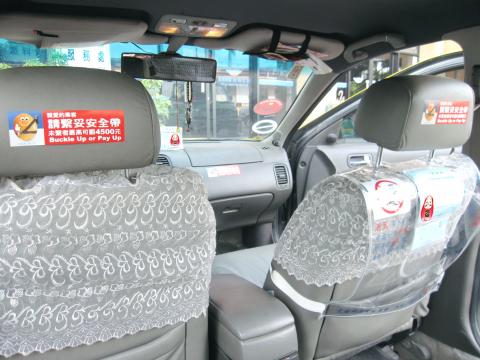The Directorate-General of Highways introduced a sticker yesterday that puts the onus on passengers sitting in back seats of taxis to fasten their seat belts or pay a fine.
According to a new law that took effect on Aug. 1, taxi drivers will be fined between NT$1,500 and NT$6,000 if their rear seat passengers are found not wearing seat belts and they were not informed before their ride of the necessity of using a seat belt.
There is a grace period — until Feb. 1 next year — before violators are penalized.

Photo: CNA, Directorate General of Highways
However, if passengers are informed by the driver to buckle up, but they decide not to, then the passengers would face a fine of NT$4,500, the agency said.
The new stickers, which read “Buckle Up or Pay Up,” were designed primarily to put the responsibility of wearing a seat belt when riding in taxis in the hands of the passenger.
The agency is recommending that taxi drivers adhere the stickers to the paneling facing the front passenger’s seat, as well as on the back of the front-seat headrests so they can be easily spotted.
By placing the stickers in those places, the drivers would meet their responsibility to inform the passengers of the law, the agency said.
The issue of wearing seat belts in the backseat gained national attention when Nora Sun (孫穗芬), a granddaughter of Republic of China founding father Sun Yat-sen (孫逸仙), was killed in a freeway car accident in January. She was not wearing a seat belt at the time of the crash.
Former Democratic Progressive Party lawmaker Chen Chao-lung (陳朝龍) first proposed the amendment to the Act Governing Punishments for Violations of Road Traffic Regulations (道路交通管理處罰條例) in 2006 after Shaw Hsiao-ling (邵曉鈴), the wife of Taichung Mayor Jason Hu (胡志強) was severly injured in a crash on a freeway near Tainan.
Shaw, who had not been wearing a seat belt, was thrown from a minivan, and lost her spleen and part of her left arm as a result of the accident.

Taiwan is stepping up plans to create self-sufficient supply chains for combat drones and increase foreign orders from the US to counter China’s numerical superiority, a defense official said on Saturday. Commenting on condition of anonymity, the official said the nation’s armed forces are in agreement with US Admiral Samuel Paparo’s assessment that Taiwan’s military must be prepared to turn the nation’s waters into a “hellscape” for the Chinese People’s Liberation Army (PLA). Paparo, the commander of the US Indo-Pacific Command, reiterated the concept during a Congressional hearing in Washington on Wednesday. He first coined the term in a security conference last

Prosecutors today declined to say who was questioned regarding alleged forgery on petitions to recall Democratic Progressive Party (DPP) legislators, after Chinese-language media earlier reported that members of the Chinese Nationalist Party (KMT) Youth League were brought in for questioning. The Ministry of Justice Investigation Bureau confirmed that two people had been questioned, but did not disclose any further information about the ongoing investigation. KMT Youth League members Lee Hsiao-liang (李孝亮) and Liu Szu-yin (劉思吟) — who are leading the effort to recall DPP caucus chief executive Rosalia Wu (吳思瑤) and Legislator Wu Pei-yi (吳沛憶) — both posted on Facebook saying: “I

Sung Chien-liang (宋建樑), who led efforts to recall Democratic Progressive Party (DPP) Legislator Lee Kun-cheng (李坤城), was released on bail of NT$80,000 today amid outcry over his decision to wear a Nazi armband to questioning the night before. Sung arrived at the New Taipei District Prosecutors’ Office for questioning in a recall petition forgery case last night wearing a red armband bearing a swastika, carrying a copy of Adolf Hitler’s Mein Kampf and giving a Nazi salute. Sung left the building at 1:15am without the armband and covering the book with his coat. Lee said today that this is a serious

A mountain blaze that broke out yesterday morning in Yangmingshan National Park was put out after five hours, following multi agency efforts involving dozens of fire trucks and helicopter water drops. The fire might have been sparked by an air quality sensor operated by the National Center for High-Performance Computing, one of the national-level laboratories under the National Applied Research Laboratories, Yangmingshan National Park Headquarters said. The Taipei City Fire Department said the fire, which broke out at about 11am yesterday near the mountainous Xiaoyoukeng (小油坑) Recreation Area was extinguished at 4:32pm. It had initially dispatched 72 personnel in four command vehicles, 16